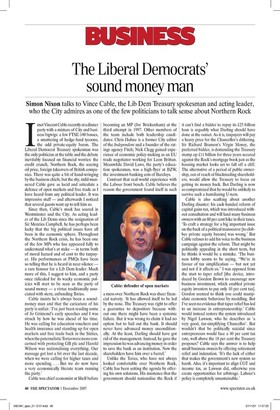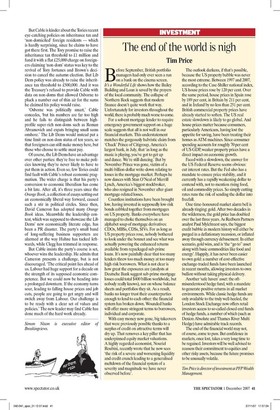The Liberal Democrats' sound money man
Simon Nixon talks to Vince Cable, the Lib Dem Treasury spokesman and acting leader, who the City admires as one of the few politicians to talk sense about Northern Rock Imet Vincent Cable recently at a dinner party with a mixture of City and business bigwigs: a few FTSE-100 bosses, a smattering of hedge-fund tycoons, the odd private-equity baron. The Liberal Democrat Treasury spokesman was the only politician at the table and the debate inevitably focused on financial worries: the credit crunch, Northern Rock, the soaring oil price, foreign takeovers of British companies. There was quite a bit of hand-wringing by the business chiefs, but the shy, mild-mannered Cable gave as lucid and articulate a defence of open markets and free trade as I have heard from any political leader. It was impressive stuff — and afterwards I noticed that several guests went up to tell him so.
Since then, Cable's stock has soared in Westminster and the City. As acting leader of the Lib Dems since the resignation of Sir Menzies Campbell, he has perhaps been lucky that the big political issues have all been in the economic sphere. Throughout the Northern Rock crisis, he has been one of the few MPs who has appeared fully to understand what's at stake — in terms both of moral hazard and of cost to the taxpayer. His performances at PMQs have been so telling that he is heard in near-silence — a rare honour for a Lib Dem leader. Much more of this, I suggest to him, and a party once ridiculed for its wacky economic policies will start to be seen as the party of sound money — a virtue traditionally associated with stern, unbending Tories.
Cable insists he's always been a soundmoney man and that the caricature of his party is unfair. 'I've just been reading some of Jo Grimond's early speeches and I was struck by how he was ahead of his time. He was calling for education vouchers and health insurance and standing up for open markets and free trade back in the Sixties, when the paternalistic Tories were more concerned with protecting GB plc and Harold Wilson was nationalising everything. Our message got lost a bit over the last decade, when we were calling for higher taxes and more spending. . . . But we do now have a very economically literate team running the party.'
Cable was chief economist at Shell before becoming an MP (for Twickenham) at the third attempt in 1997. Other members of the team include both leadership candidates: Chris Huhne is a former City editor of the Independent and a founder of the ratings agency Fitch; Nick Clegg gained experience of economic policy-making as an EU trade negotiator working for Leon Brittan. Meanwhile David Laws, the party's education spokesman, was a high-flyer at BZW, the investment-banking arm of Barclays.
Contrast that real-world experience with the Labour front bench. Cable believes the reason the government found itself in such a mess over Northern Rock was sheer financial naivety. 'It has allowed itself to be led by the nose. The Treasury was right to offer a guarantee to depositors because without one there might have been a systemic failure. But it was wrong to claim it had no option but to bail out the bank. It should never have advanced money unconditionally. At the least, Darling should have got rid of the management. Instead, he gave the impression he was advancing money in order to save the bank as an institution. Now the shareholders have him over a barrel.'
Unlike the Tories, who have not always looked comfortable over Northern Rock, Cable has been setting the agenda by offering his own solutions. His insistence that the government should nationalise the Rock if it can't find a bidder to repay its .E25 billion loan is arguably what Darling should have done at the outset. As it is, taxpayers will pay a heavy price for the Chancellor's dithering. Sir Richard Branson's Virgin Money, the preferred bidder, is demanding the Treasury stump up .E11 billion for three years secured against the Rock's mortgage book just as the housing market looks set to fall off a cliff. The alternative of a period of public ownership, out of reach of blackmailing shareholders, would allow the Treasury to focus on getting its money back. But Darling is now so compromised that he would be unlikely to survive such a humiliating U-turn.
Cable is also scathing about another Darling disaster: his cack-handed reform of capital gains tax, which was introduced without consultation and will land many business owners with an 80 per cent hike in their taxes. 'To craft a strategy for a big important issue on the back of a political manoeuvre [to clobber private equity barons] was wrong.' But Cable refuses to add his voice to the business campaign against the reform. That might be politically appealing in the short term, but he thinks it would be a mistake. 'The business lobby seems to be saying, "We're in favour of tax simplification — but not yet and not if it affects us." I was opposed from the start to taper relief [the device, introduced by Gordon Brown to encourage new business investment, which enabled private equity investors to pay only 10 per cent tax]. Gordon seemed to think you could manipulate economic behaviour by meddling. But I've seen no evidence that taper relief has led to an increase in entrepreneurship.' Cable would instead restore the system introduced by Nigel Lawson, who he describes as 'a very good, tax-simplifying Chancellor'. But wouldn't that be politically suicidal since entrepreneurs would face a 40 per cent tax rate, well above the 18 per cent the Treasury proposes? Cable says the answer is to help small business owners by offering retirement relief and indexation. 'It's the lack of either that makes the government's new system so harsh. Also, it's important to align CGT and income tax, as Lawson did, otherwise you create opportunities for arbitrage. Labour's policy is completely unsustainable.'
But Cable is kinder about the Tories recent eye-catching policies on inheritance tax and 'non-domiciled' foreign residents — which is hardly surprising, since he claims to have got there first. The Tory promise to raise the inheritance tax threshold to £1 million and fund it with a flat £25,000 charge on foreigners claiming 'non-dom' status was key to the revival of Tory fortunes and Brown's decision to cancel the autumn election. But Lib Dem policy was already to raise the inheritance tax threshold to £500,000. And it was the Treasury's refusal to provide Cable with data on non-doms that allowed Osborne to pluck a number out of thin air for the sums he claimed his policy would raise.
'Osborne was politically smart,' Cable concedes, 'but his numbers are far too high and he fails to distinguish between highprofile super-rich non-doms such as Roman Abramovich and expats bringing small sums onshore.' The Lib Dems would instead put a time limit on non-dom status of ten years, so that foreigners can still make money here, but those who choose to settle must pay.
Of course, the Lib Dems have an advantage over other parties: they're free to make policies knowing they're never likely to have to put them in action. Even so, few Tories could find fault with Cable's robust economic pragmatism. The wider charge is that his party's conversion to economic liberalism has come a bit late. After all, it's three years since the Orange Book, a collection of essays setting out an economically liberal way forward, caused such a stir in political circles. Since then, David Cameron has adopted many Orange Book ideas. Meanwhile the leadership contest, which was supposed to showcase the Lib Dems' new economically literate edge, has been a PR disaster. The party's small band of long-suffering business supporters are alarmed at the way Huhne has tacked leftwards, while Clegg has trimmed in response.
But Cable insists the party's course is set, whoever wins the leadership. He admits that Cameron presents a challenge, but is not discouraged. 'The critical point lies ahead of us. Labour had huge support for a decade on the strength of its supposed economic competence. But we could now be heading into a prolonged downturn. If the economy turns sour, leading to falling house prices and job cuts, people are going to get angry and will switch away from Labour. Our challenge is to be ready with a clear set of values and policies.' The new leader may find Cable has done much of the hard work already.
Simon Nixon is executive editor of Breakingviews.






































































 Previous page
Previous page